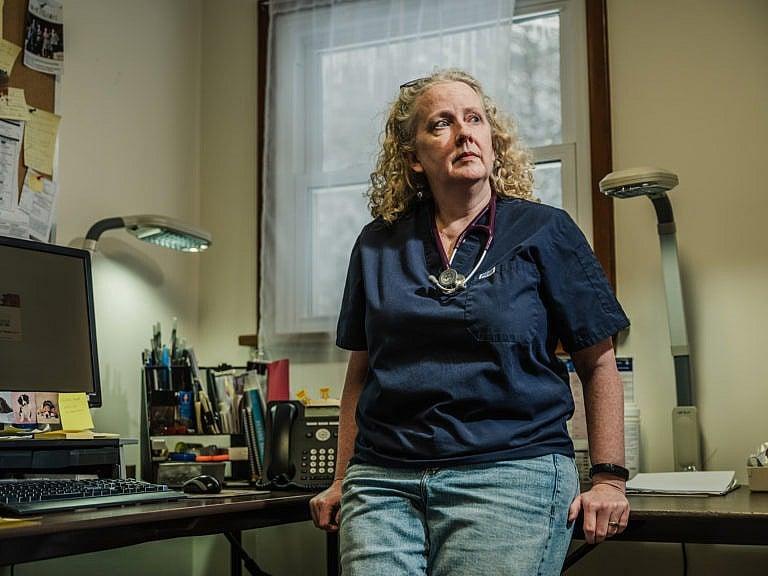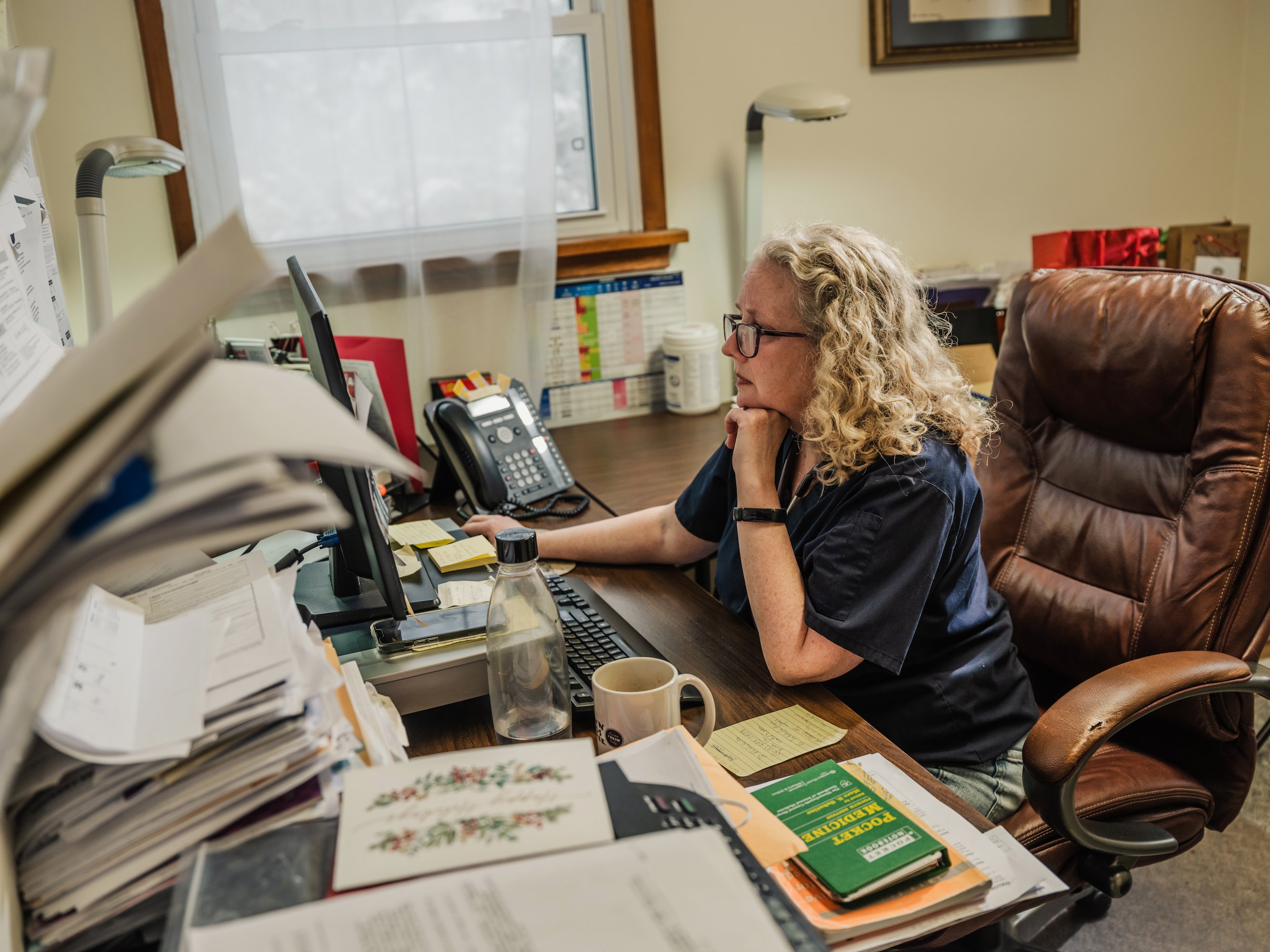Thousands of patients. No help. Meet the lone family doctor of Verona, Ontario.
I’m the only family doctor in a 2,000-person Ontario town. It’s impossible to be the doctor I want to be.

For seven years, Sabra Gibbens has been the only family physician available to her rural community (Photos by Johnny C.Y. Lam)
Share
I got into family medicine in a roundabout way. In my 20s, I did my graduate studies in philosophy in the United States, and after that, I spent nine years working in management and software consulting, which had me on the road nearly 50 weeks out of the year. In 2002, my husband accepted a teaching position at Queen’s University in Kingston, Ontario, so we decided to move to nearby South Frontenac township. At that point, I was 39 years old and had grown disenchanted with my career. I wanted to travel less and make more of a difference in my community. Even back then, I was reading stories about a shortage of family doctors, so in 2009, I enrolled in Queen’s School of Medicine.
I was the only first-year student with kids: ours were five and one, and our third came along in year two. Motherhood forced me to become really good at time management. For four years, I diligently chipped away at my assignments, forgoing most parties and social events in favour of time with my young family. After another two years of residency, I completed my studies in 2015. After graduation, I was recruited by a medical clinic in Verona, a 2,000-person town a half-hour north of Kingston. I was replacing an older woman who was retiring. Despite being one of just two family doctors on staff caring for 1,200 patients, it sounded like a dream job. Early on, it was.
Verona is a tight-knit community. Soon after I started working, patients began approaching me in public places, like the grocery store, stopping to say hello and, sometimes, asking me about x-ray results. Things got complicated when the clinic’s only other physician decided to return to residency. We had nobody in the pipeline to take his place. Suddenly, I found myself responsible for his patients in addition to my own—2,500 people in total. The workload was daunting, but what other choice did I have? I couldn’t leave Verona’s community without a family doctor, many of whom are elderly and couldn’t commute to Kingston for appointments. If I left, I’d also be putting our staff—a registered nurse, an officer manager, nurse practitioner and four others—in a tight financial spot. We need patient fees to pay our lease, salaries and equipment. In the end, I doubled my roster and promised myself I’d recruit a second doctor as soon as I could.
My first year as a solo doctor was particularly brutal: I worked 80 hours or more every week. I went months without taking a single day off. I enjoyed one weekday supper with my family during that entire year, and I rarely saw my own kids. I’d usually get home after they went to sleep. It’s been seven years and I’m still the only family doctor in Verona, though, now that I know my patients (and their charts) so well, I’ve gotten my weekly commitment down to roughly 65 hours. I see patients in-person (or online). I file paperwork, read bloodwork and analyze reports from specialists. On top of that, there’s the administrative work of managing office supplies, troubleshooting IT issues, shovelling snow, coordinating vaccine clinics and trying to find back-up when staff members (or their children) are sick. I have no choice but to wear a lot of hats.
RELATED: I was a nurse for 10 years in Scotland. So why can’t I get certified in Canada?
At this point, I’m stretched too thin to be the kind of doctor I want to be; I have to sacrifice quality for the sake of quantity. I receive periodic reports on how I stack up to other family doctors, in my region and across Ontario, on delivery of colon-cancer screening, mammograms, flu shots and other services. I’m below average on a few of them. I’m often too busy reacting to problems to be proactive with preventative measures—and I hate that. It pains me to know that there are likely patients out there with cancers going undetected, ones that could be caught and treated early, because I have no time to reach out.

What hurts the most is that we’ve seen how much of a positive impact our clinic has when we have the bandwidth. About a year ago, a patient came in who had been having difficulty swallowing for months. They had risk factors for cancers of the gastrointestinal tract, so we immediately ordered tests and sent off a referral for an endoscopy. We were able to get them in to see a specialist right away—a good thing because there was, in fact, a problem. Since treatment, that patient is doing incredibly well. But for these seven years, our clinic has failed to provide timely care more than it’s succeeded.
Our phones ring non-stop, and it breaks my heart. Some calls fall through, and we often have no choice but to refer some of our patients to the ER in Kingston. Some patients have become so frustrated with our wait times that they have gotten snarky and abusive with our staff. I’ve started writing letters to them, trying to help them understand the stress we’re under. I sometimes tell them that they’re welcome to seek out primary care elsewhere if they are tired of waiting. Sometimes, I lose my cool, too. I like to think those moments are rare, but the truth is that, most days, I have to psych myself up to work because my tank is empty.
I’ve tried all kinds of ways to recruit a second family physician. I’ve published advertisements on HealthforceOntario and posted on online forums. I’ve even invited medical students to stay at my house to see if working in a small town is a good choice for them. There were a few close calls: one visiting doctor entertained us, but then chose a more urban hospital. Another eventually decided to specialize in obstetrics. A lot of new doctors in Canada are realizing that the family-doctor path often comes with a 2,000-patient roster, so they decide to specialize in something else.
Recruiting people to Verona, specifically, is an uphill battle. Nearby cities like Kingston can afford to offer six-figure signing bonuses, and communities more rural than ours (like Northbrook and Sharbot Lake) can do the same because they qualify for provincial rurality funding. Verona is in the middle—not big or small enough to do either. Why would a medical student who is probably $200,000 in debt come work with me if they can make much more money anywhere else? I sometimes think I’ll be stuck with this unsustainable burden forever.
MORE: I began my ER nursing career in Ontario. Burnout and low pay led me to leave for the U.S.
I say “forever” because, if things stay the way they are, I don’t see how I could ever quit or retire. If I did that, I’d be leaving 2,500 patients without care. That’s a huge responsibility, one I cannot convince myself to shirk. The same could be said if I suffered an accident. For now, all I can do is continue my recruitment efforts, and hope that more family doctors enter the workforce. For that to happen, we need a better funding structure and more encouragement towards family medicine within Canadian medical schools. I’ve noticed that much of the med-school curriculum is taught by specialists, some of whom disparage—implicitly or explicitly—physicians who are just GPs. Instead, we need to communicate to students that family doctors are essential. And that, without more physicians entering longitudinal primary care in the coming years, we will face the complete collapse of our health care system— undetected heart attacks, strokes and cancers; a profound deterioration of Canadians’ mental health; and an angry, sick population looking for someone to blame for their misery.
I often think of what would happen to Verona if it had no clinic. Recently, a woman came into my office with a sore chest and a heavy left arm. She was not feeling well, but she didn’t want to bother anyone—or drive all the way to Kingston, for that matter. We did an electrocardiogram because I was concerned she was having a heart attack. I was right; she was. Because we called an ambulance to get her to Kingston, she was treated on time. I don’t know if that woman would have survived had we not been close by.
It’s those moments that remind me of the satisfaction and joys of family medicine. I hope new doctors can find that same value in it. Canada’s family doctors are drinking from a fire hydrant right now, but we still have good days—days when patients come to our clinic with an issue, when I can see them immediately and I get to say: Yes! That’s how it’s supposed to work. In those rare instances, I remember that this is my dream job, even seven hard years in. I’m trying to be optimistic that, 10 or 15 years from now, the situation will be different, and that I will be able to retire, knowing that when I leave my patients, they’ll be in good hands.
—As told to Alex Cyr